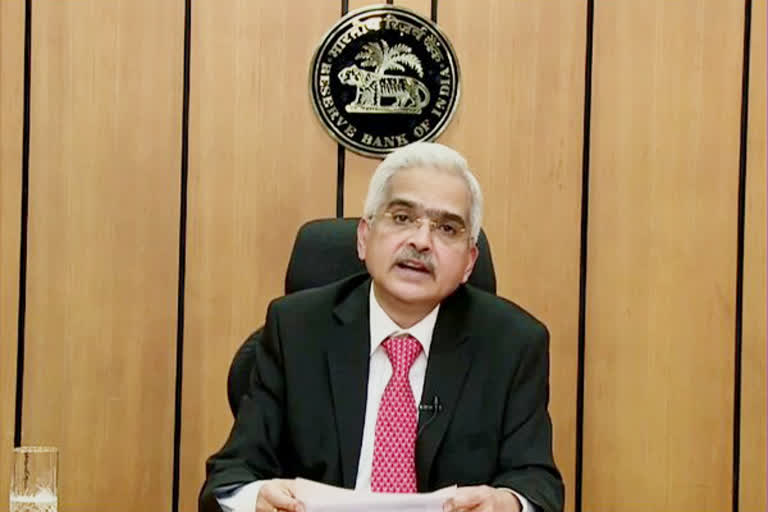New Delhi: The Reserve Bank of India Friday announced a slew of measures that include a moratorium on EMI and interest payments for three months on term loans across the board and reduced the policy rate by 75 basis points to give relief to middle class and businesses reeling under pressure due to the three-week lockdown announced by Prime Minister Modi on March 24 to prevent the community spread of deadly Coronavirus.
The move has come as a big relief for millions of home loan and auto loan borrowers who were concerned to meet their loan payment obligations as the EMI payments were due in the next few days and shut down of economic activity across the country has cast a shadow on timely release of salary and wages to the working class.
"All commercial banks including RRBs, small finance banks, local area banks, co-operative banks, all-India financial institutions, and NBFCs, including housing finance companies and micro-finance institutions are being permitted to allow a moratorium of three months on payment of instalments in respect of all term loans outstanding as on March 1, 2020," RBI Governor Shaktikanta Das said in a video conference from Mumbai.
He said the moratorium on term loans and the deferring of interest payments on working capital will not result in asset classification downgrade, which basically means in case of default on loan payment during this period, the loan accounts will not be classified as bad loans.
The RBI also reduced the amount of money to be set aside by the banks to inject an additional liquidity of Rs 2.74 lakh crore in the system to minimise the impact of coronavirus outbreak on the country’s economy in addition to cutting the benchmark policy rates.
“After extensive discussions, the MPC voted unanimously for a sizeable reduction in the policy repo rate and for maintaining the accommodative stance of monetary policy as long as necessary to revive growth, mitigate the impact of COVID-19, while ensuring that inflation remains within the target,” said Shaktikanta Das while announcing the decisions taken by the Monetary Policy Committee in its three day meeting held in Mumbai on March 24, 26 and 27.
Read more:COVID-19: RBI cuts repo rate by 75 basis points; announces 3-month moratorium on EMI
By a majority of 4 to 2, the MPC approved reduction of repo rate, the rate at which banks borrow short term loans from the RBI, from 5.15% to 4.4%, a reduction of 75 basis points. It also reduced the reverse repo rate, the rate at which banks park their surplus funds with the RBI, from 4.9% to 4%, a reduction of 90 basis points to minimise the difference between repo and reverse repo rate in its bid to discourage the bank from parking surplus funds with the RBI.
“Accordingly, the marginal standing facility (MSF) rate and the Bank Rate stand reduced to 4.65 per cent from 5.40 per cent,” RBI said in a statement.
These measures have been announced by advancing the date of the meeting of the Monetary Policy Committee (MPC) which was scheduled to begin its meeting on March 31 and declare the outcome on April 3. The Reserve Bank could not have changed the policy rates – Repo & Reverse Repo rates, without the sanction of Monetary Policy Committee which has the mandate to set the policy rate under the Reserve Bank of India Act of 1934.
The RBI decided to advance the dates of MPC meeting following the criticism that it was delaying a policy response to the severe public health challenge faced by the country whereas other central banks in America and Europe had already announced their measures at the start of outbreak of the Coronavirus in their countries.
Relief to borrowers: EMI payment deferred
In a major decision, the RBI has permitted all kinds of lenders in the system – scheduled commercial banks, RRBs, co-operative banks, small finance banks, local area banks, NBFCs, and micro-finance institutions to allow a moratorium on payment of EMIs in respect of all term loans such as home loan, auto loan and personal loan that are outstanding on March 31, 2020.
It means the tenor for all such loans can be shifted by three months, which means if the borrowers are not able to pay EMIs during these three months then the lending institution can allow them to avail the moratorium and their loan accounts will not be classified as NPAs.
Earlier if a borrower defaulted on payment of either principal or interest for 90 days then the banks were required to classify that loan account as non-performing asset (NPA) or a bad loan. In case of loan from non-banking finance companies, the limit to declare NPA was 120 days.
RBI said non-payment of EMI during this period will not affect a borrower’s credit standing.
